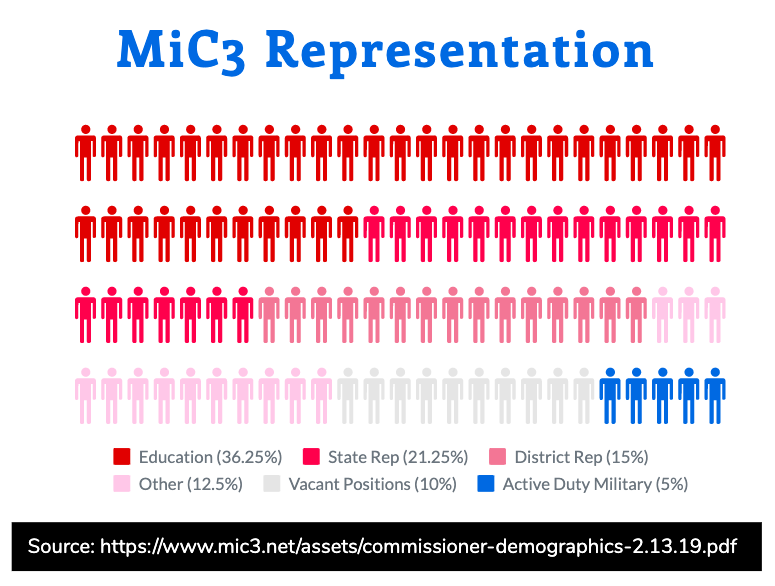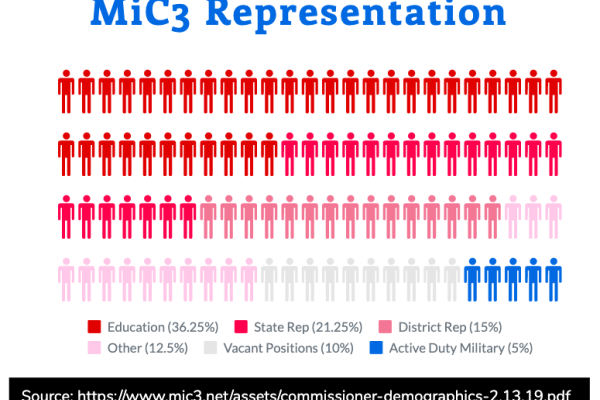Military spouses are leaning into big problems. They are advocating for better improved employment opportunities and leading the way to correct PCS complications and privatized housing struggles. Slowly spouses are earning their seats at the proverbial table. Seeing changes in education delivery is the next step in a post-COVID world. Partners in PROMISE is equipping these powerhouse military spouses with a free State Advocacy Toolkit to open doors previously open only to service members.

What is MiC3?
Prior to moving to a new location, military families research schools, find a home, hope the furniture isn’t broken and do everything they can to ensure their children transition smoothly. The Military Interstate Children’s Compact Commission, or MiC3, was created to assist military families with military-related moves. The MiC3 facilitates an agreement, or a compact, signed by all 50 states. The compact provides rights and protections to military-connected children and their families to protect them from being a school district afterthought.
Some issues that MiC3 covers:
- Transfer of Educational Records
- Course & Educational Program Placement
- Special Education Services
- Absence Related to Deployment Activities
- Eligibility for Student Enrollment
- Eligibility for Extracurricular Participation
- Waiving courses required for graduation if similar course work has been completed
If it’s not broken does it need fixing?
The MiC3 operates through committees composed of state and local government officials and military representatives within states. There are also military representatives as outlined by in a Department of Defense Memorandum of Understanding.
What does not currently exist is a spot on these councils for military spouses, who often manage school enrollment and participation while the active duty member is deployed. Partners in PROMISE believes the decisions that impact military children require the varied voices of both active duty and civilian military parents.
Is this possible?
Partners in PROMISE founder and Executive Director, Michelle Norman was instrumental in ensuring military spouses’ voices are heard in her state of Virginia. Her efforts to advocate for representation resulted in not one, but two seats for military spouses on the Virginia MiC3.
“It just makes sense, because they’re the people who best understand the challenges,” Norman told Alison Johnson of the Virginia Pilot. “They will bring in a vast amount of knowledge and ideas on real-world solutions. This is the perfect time to amplify their voices.”
Norman was surprised that military spouses were absent from the typical composition of MIC3 Councils that include education leaders, public officials, school employees, non-profit organizations and an active duty member. “The irony is that the active duty member is usually checking in or out, away at training, or already deployed when a military family is registering for the new school. The burden falls on the military spouse the majority of the time to oversee their children’s education process,” said Norman. “Fortunately, my local legislator, a military veteran himself, agreed and we collaborated to change the law. The law passed unanimously in the 2020 Virginia General Assembly and set the bar for other states to follow.”
What is in the toolkit?
Instead of keeping her work tucked away in a file collecting dust, Norman created a toolkit to help other military spouses advocate for spots on their state’s MiC3 committee. The toolkit, created by Partners in PROMISE includes:
- Contact information
- Email/letter templates
- Partners in PROMISE letter of endorsement
- Training videos
- One-on-one guidance
Next steps
Military spouses interested in joining Partners in PROMISE to create seats on the council in their state simply need to connect with Partners in PROMISE by visiting their website: https://thepromiseact.org/state-advocacy-toolkit/
“We know that we are all stronger together. While Partners in PROMISE could try to work with state-level legislatures to help inform them of the problems faced by our military-connected students, we know that military spouses are up to this task,” said Jennifer Barnhill, Chief Operating Officer of Partners in PROMISE. “Military spouses become advocates the moment we say, ‘I do.’ The DoD is complex, and it can’t be everything to everyone. As military spouses we know that our job is to speak up when things are no longer working.”
Partners in PROMISE wants to empower families to advocate for themselves and they won’t do it alone. Partners in PROMISE will work with spouses to walk them through the process and help connect them to military educational resources for all military-connected children, not only those with exceptional learning needs.
Because Partners in PROMISE has formed Resource Partnerships with military service organizations such as Military Child Education Coalition (MCEC) and Blue Star Families and civilian organizations like CHADD that services the ADHD community and nationally-placed Parent Centers, they have a wealth of curated military-friendly resources. These resources will help the newly initiated MiC3 representatives stay connected to a variety of educational issues.
“We are hopeful that military spouse voices will be heard in a variety of legislative formats and topics,” said Barnhill. “We are strong, resilient and really good at fixing our own problems when shown an open door.”





Leave a Reply